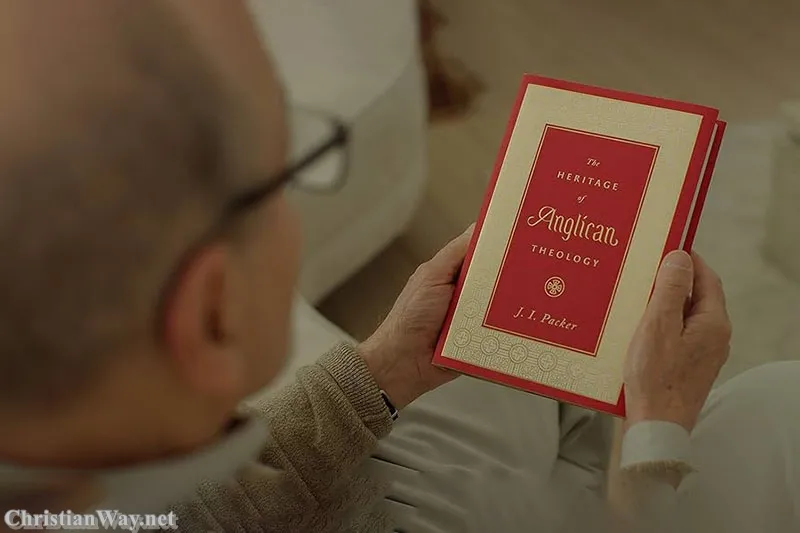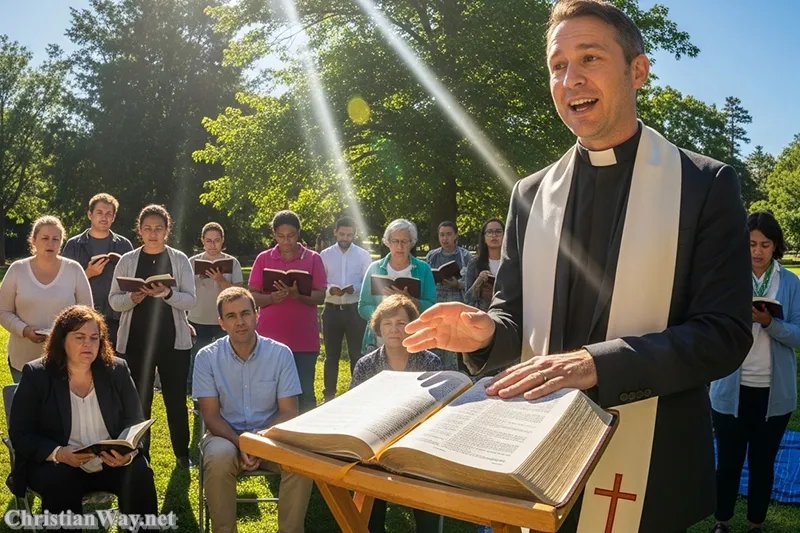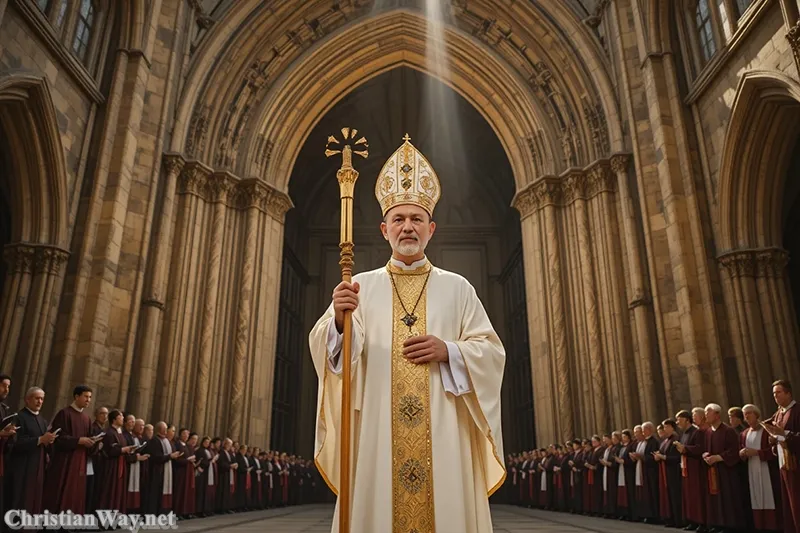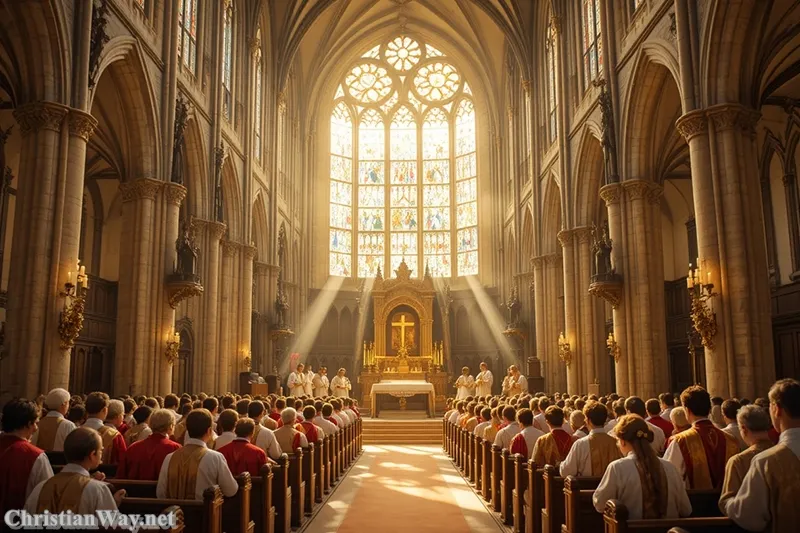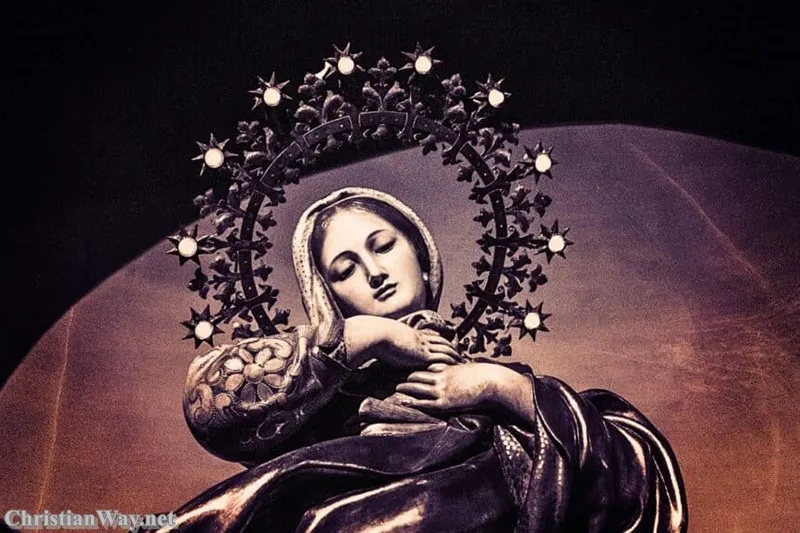Every act of worship within the Anglican tradition begins and ends with the breath of the Holy Spirit. The Spirit is not an accessory to worship — He is its very life. It is the Spirit who gathers the faithful, who opens the Scriptures, who sanctifies the bread and wine, and who sends the Church forth in peace. Without the Holy Spirit, worship becomes mere ceremony; with the Spirit, it becomes communion with the living God.
Dear friends in Christ, the mystery of worship is that heaven and earth meet in the humble hearts of believers who are drawn together by grace. The Anglican Church, in its beautiful rhythm of Word and Sacrament, morning and evening prayer, hymn and silence, depends on the Spirit’s presence to make every word and gesture an offering of love. When we speak of Anglican worship, we are truly speaking of the Spirit’s work in shaping a community that prays, listens, and gives thanks.
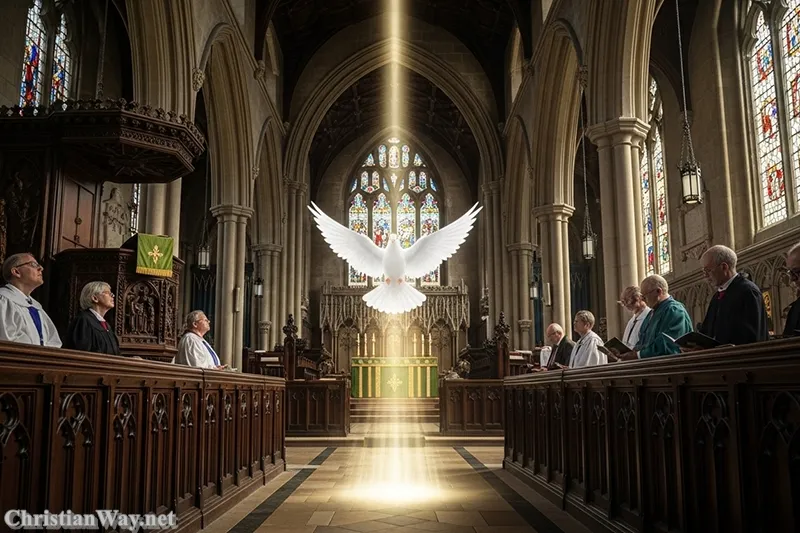
In this reflection, let us journey through how the Holy Spirit moves within Anglican worship — from the liturgy that forms our hearts, to the sacraments that reveal Christ’s grace, to the daily prayers that sustain our life in God.
The Spirit Who Calls Us to Worship
At the heart of every liturgy lies an invitation — a quiet call to gather in the name of the Lord. This call is the work of the Holy Spirit. Before we ever respond in prayer, it is the Spirit who awakens desire within us. It is He who stirs the soul to seek communion with God, to step out of the noise of the world and into the peace of divine presence.
In the Anglican Book of Common Prayer, the opening words of Morning Prayer — “O Lord, open thou our lips, and our mouth shall show forth thy praise” — express this truth. The Spirit opens the lips of the Church to sing. The very act of prayer begins not with human initiative but with divine grace.
The Spirit and the Gathering of the Church
Anglican worship is profoundly communal. The Spirit unites believers not merely as an audience before God but as the Body of Christ offering itself in thanksgiving. Each voice in the liturgy — from the priest to the child in the pew — is drawn into harmony by the Spirit. As St. Paul wrote, “For in one Spirit we were all baptized into one body” (1 Corinthians 12:13).
This unity in the Spirit does not erase individuality; rather, it transforms diversity into a living harmony. The Anglican parish, whether a grand cathedral or a small countryside chapel, becomes a microcosm of Pentecost — people of different backgrounds and experiences joined in one faith, one prayer, one Spirit.
The Spirit in the Word of God
Every reading of Scripture in Anglican worship is an act of the Spirit. When the lector stands and says, “The Word of the Lord,” and the congregation replies, “Thanks be to God,” this exchange is more than ritual — it is the Spirit speaking and the Church responding.
Inspiration and Illumination
The Holy Spirit who inspired the prophets and apostles continues to speak through their words today. Yet inspiration alone is not enough. We need illumination — the Spirit’s gift of understanding — to truly hear God’s voice. The Collect for the Second Sunday in Advent beautifully expresses this Anglican conviction:
“Blessed Lord, who hast caused all holy Scriptures to be written for our learning: grant that we may in such wise hear them, read, mark, learn, and inwardly digest them…”
It is the Spirit who enables us to “inwardly digest” the Word, transforming Scripture from ink on a page into the living voice of Christ.
The Homily and the Spirit’s Voice
When the priest preaches, it is not a human lecture but a spiritual proclamation. The Spirit takes the words spoken and plants them as seeds in the hearts of the listeners. Some fall on rocky ground, some among thorns, but some — by the grace of the Spirit — bear fruit thirtyfold, sixtyfold, a hundredfold.
For Anglicans, the sermon stands within the flow of worship, not above it. It is the Word interpreted by the Spirit, not by mere intellect. The preacher prays before ascending the pulpit that the Spirit would “speak through human lips that which reveals the mind of Christ.”
The Spirit in the Sacraments
If the Word feeds the mind, the Sacraments feed the soul. And in every Sacrament, it is the Holy Spirit who acts — unseen yet profoundly real — to bring divine grace to human hearts.
The Spirit and the Eucharist
Nowhere is the Spirit’s work more tenderly and powerfully present than in the Holy Eucharist. In the Great Thanksgiving, Anglicans invoke the Spirit in words that echo the ancient Church:
“And we most humbly beseech thee, O merciful Father, to hear us; and, of thy almighty goodness, vouchsafe to bless and sanctify, with thy Word and Holy Spirit, these thy gifts and creatures of bread and wine…”
This prayer — known as the epiclesis — asks the Father to send the Holy Spirit upon the bread and wine that they may become the Body and Blood of Christ. But the Spirit’s work does not stop at the altar. The prayer continues:
“…and that we, receiving them according to thy Son our Savior Jesus Christ’s holy institution, may be partakers of his most blessed Body and Blood.”
The Spirit changes not only the elements but also the hearts of those who receive. The Eucharist is not magic but mystery — a meeting between the Spirit who sanctifies and the believer who responds in faith.
The Spirit in Baptism
From the first waters of creation to the baptism of Jesus in the Jordan, the Holy Spirit has always hovered over the waters, bringing life and renewal. In Anglican baptismal liturgy, the priest prays:
“We thank thee, Almighty God, for the gift of water… and we pray that all who are baptized therein may be born again of water and the Holy Spirit.”
Here again, the Spirit is not symbolic but active — cleansing sin, creating new birth, sealing the baptized with the sign of the cross. As the oil touches the forehead and the words are spoken, “You are sealed by the Holy Spirit in Baptism and marked as Christ’s own forever,” a divine reality takes root: the Spirit claims the soul for eternity.
The Spirit in the Rhythm of Prayer
Anglican worship breathes with prayer — morning and evening, in the church and at home, in solitude and in song. This rhythm of daily prayer, sustained through the centuries, is itself the work of the Spirit who “helps us in our weakness” and “intercedes for us with sighs too deep for words” (Romans 8:26).
The Spirit in the Daily Office
The Morning and Evening Prayer of the Anglican tradition are not simply times of devotion but moments of renewal. The Spirit sanctifies time itself — turning the ordinary hours of the day into holy offerings. In the quiet of dawn or the calm of dusk, the Spirit draws the heart toward praise and gratitude, teaching us to see every moment as filled with divine presence.
The Spirit in Music and Silence
Anglican worship is renowned for its music — hymns that lift the soul, psalms sung with reverence, choirs echoing through ancient stone. Yet music, too, is the work of the Spirit. The hymnist Charles Wesley once prayed that his songs might “kindle a flame of sacred love on the mean altar of my heart.” The Holy Spirit uses melody to awaken faith, to comfort the sorrowful, to unite voices into one heart of praise.
But just as the Spirit moves in song, He also dwells in silence. The pauses in liturgy, the moments when no word is spoken — these, too, are filled with His presence. For in the stillness, the Spirit speaks to the depths of the soul.
The Spirit and the Church’s Mission
Anglican worship does not end with the final blessing. It sends forth the faithful into the world — filled with the Spirit — to be Christ’s hands and heart among the people.
When the deacon or priest proclaims, “Go in peace to love and serve the Lord,” the congregation replies, “Thanks be to God.” This is more than dismissal; it is commissioning. The same Spirit who hovered over the waters, who descended at Pentecost, who sanctifies bread and wine, now breathes through the baptized as they enter daily life.
Worship forms mission, and mission renews worship. The Spirit who gathers also sends; the Spirit who sanctifies also empowers. Anglican spirituality holds these movements together — the inward journey of prayer and the outward journey of service.
In works of mercy, in the care of creation, in acts of reconciliation, the Spirit continues His song through the Church’s life. Each believer becomes, in St. Augustine’s words, “a living Alleluia.”
The Spirit of Unity and Peace
The Anglican tradition, with its balance of Scripture, Tradition, and Reason, has long sought to embody the Spirit’s gift of unity. Though diverse in expression — from the high solemnity of cathedral choirs to the simple gatherings of mission parishes — Anglican worship finds its center in the same Spirit who binds all believers in love.
The collect for unity in the Book of Common Prayer prays:
“O God, the Father of our Lord Jesus Christ, our only Savior, the Prince of Peace: give us grace seriously to lay to heart the great dangers we are in by our unhappy divisions…”
This prayer is the Spirit’s own longing for reconciliation. For it is the Spirit who makes us one body, one Church, one communion of love.
Reflect and Pray
Every Anglican liturgy, every hymn, every whispered prayer is a movement of the Holy Spirit drawing creation back to its Creator. The Spirit gathers us, teaches us, feeds us, and sends us — so that worship may not be confined to an hour on Sunday but become the song of our entire lives.
Let us, then, live as a people of the Spirit — joyful, prayerful, and filled with peace. May our worship always be alive with His presence, and may our lives bear witness to the love that He pours into our hearts.
A Prayer:
Come, Holy Spirit, Breath of God,
Fill our hearts with the fire of your love.
Sanctify our worship, that it may reveal Christ.
Renew your Church, that it may shine with your light.
And send us forth in peace, to serve and to bless,
Until all creation joins in your eternal praise.
Amen.
— Fr. John Matthew, for Christian Way

